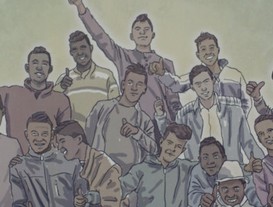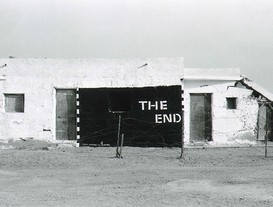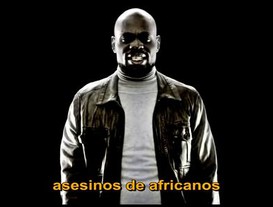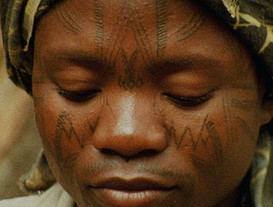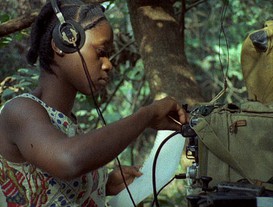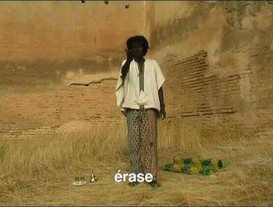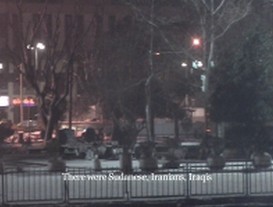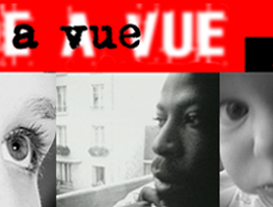
Del 4 al 6 de novembre
Can Felipa
Descolonitzar la visió
Descolonitzar la visió seria retornar-la, integrar-la al cos i als altres sentits, integrar-la al lloc, a les seves forces i buits… rescatar-la de la tirania del merament òptic per a obrir-la als altres ulls del cos i l’ànim, fer-la integral. Obrir també el diàleg amb aquell poder de la visió que la cultura dominant en occident va excloure o va disseccionar fins a extingir-la.
Toni Serra *) Abu Ali
La selecció de vídeos inclosa en el projecte de Sabers migrants proposa construccions alternatives de pensament, anàlisi i reflexió sobre les migracions, a partir d’una pluralitat de mirades, experiències, memòries i relats que convergeixen en un programa de tres dies presencials i 2 setmanes de menú en línia, a partir del mitjà audiovisual, mitjançant la difusió d’una selecció de vídeos dels Arxius OVNI – Observatori de Vídeo No Identificat.
Enfront de la visió de la multiculturalitat com a espai predefinit i consensuat pel poder, la institució i la violència, l'”altre” és tancat en parcel·les, i és cada vegada més necessari i urgent l’intercanvi de coneixements i experiències, que contempli la transformació profunda de les nocions que han configurat el món globalitzat, fent una revisió radical de les nocions de temps, treball, cultura, i la persistència d’un model únic amb la seva deriva totalitària. Iniciar un procés de descolonització mitjançant la de-construcció i transformació de les nocions i creences que han configurat les nostres societats.
El colonialisme modern no és només un fenomen històric, sinó abans de res una actitud davant la vida i el món. Una mirada que divideix i secciona les coses, una mirada que crea i projecta lo “altre”, i ho contempla com a espai a ocupar, territori, cultura, fins i tot temps, a colonitzar. Per la seva pròpia naturalesa no pot entendre ni practicar una unitat orgànica de les coses, ni tampoc de l’existència, encara menys de l’economia. Requereix permanentment de l'”altre” fins al punt de seccionar-lo de si mateix.
En el programa de vídeos seleccionats, hi ha resistències de diversos orígens i llengües que es despleguen enfront de la imposició d’un pensament únic i hegemònic. Relats que fan possible pensar, construir altres mons, i descobrir els ja existents, moltes vegades ocultats per pantalles d’ignoràncies i prejudicis, i per imatges estereotipades de l’”altre”.
La selecció de vídeos ha estat realitzada per Toni Cots. El programa està organitzat per Jiser i Arxius OVNI i s’emmarca en el procés de reflexió realitzat pel col·lectiu Sabers migrants.
__
Jiser, que significa “pont” en àrab, és una associació sense ànim de lucre amb seu a Barcelona, l’objectiu de la qual és promoure la creació artística i l’ús de l’art com a eina de transformació social en l’espai Euro-mediterrani, a través de la realització d’activitats conjuntes que afavoreixin l’intercanvi i l’acostament entre les diferents realitats artístiques i culturals de la regió.
Els Arxius OVNI recullen i documenten tres dècades, des del vídeo analògic fins al vídeo digital en l’època de les xarxes “socials”. Els materials continguts en l’Arxiu són el resultat dels diversos projectes temàtics de recerca, tota una constel·lació de títols amb el denominador comú de la seva lliure expressió i reflexió sobre les pors i els plaers individuals i col·lectius, construint en conjunt una visió de múltiples facetes, com a milers de petits ulls, que aprofundeixen i exploren el nostre món, o anuncien altres possibles. Un procés de recerca on els principals valors són l’heterogeneïtat, la contradicció i la subjectivitat des de les quals es realitza. Per si sol, tot un antídot a la clonació i repetició en l’època de la híper-connectivitat.
Sabers migrants constitueix un col·lectiu format per activistes, artistes i investigadores que, des de múltiples llocs, planteja la reflexió crítica i col·lectiva sobre las violències simbòliques i institucionals que travessen a les persones migrants i/o racialitzades. Proposa crear llocs de trobada que visibilitzin i combatin els mecanismes que legitimen l’exercici d’aquestes violències i construeixin narratives de resistència que reivindiquin el dret a tenir drets de les persones que migren.
Aquest procés es teixeix connectant pràctiques artístiques i reflexives, està obert a la pluralitat d’històries, és flexible en el seu caminar… i reivindica no només l’exercici de la consciència crítica; sinó també el desenvolupament d’accions que siguin transformadores de les situacions de discriminació, racisme i desigualtat.
PROGRAMA
Dijous, 4 de novembre 18:30h – 21:00h
VIOLÈNCIES <> RESISTÈNCIES
London "I don't call it rioting, I call it an insurrection"
BBC, 2011. Regne Unit. VO Anglès. S. Castellà. 5Min.
Entrevista sobre els esdeveniments de Londres del 2011, amb l’escriptor i veí Darcus Howe: “Una mica de respecte per a un vell afro-caribeny ‘negre’!” “No, no, això no és un disturbi, és una insurrecció, la insurrecció del poble!»
Concerning Violence
Göran Hugo Olsson, 2014. Suècia, Dinamarca, Finlàndia, USA, VO Anglès,. S. Castellà. 85Min.
Un documental compost d'imatges d'arxiu dels moments més arriscats en la lluita per a l'alliberament del Tercer Món i, alhora, una anàlisi dels mecanismes de descolonització a través de fragments del llibre Els condemnats de la terra de Frantz Fanon.
__
Divendres, 5 de novembre 18:30h – 21:00h
VIOLÈNCIES
Le problème algérien et l'economie française
Jean Pierre Gambarotta, 2006. VO Francès. S. Castellà. 5Min.
Reportatge governamental francès que exposa les raons per les quals era impossible acceptar la independència d'Algèria.
Territoire Perdu
Pierre-Yves Vandeweed, 2011.Bèlgica, Sàhara Occidental. VO Àrab, S. Català. 74Min.
La pel·lícula retrata la lluita, l'exili, la interminable espera i posterior arrest, i les vides perseguides als dos costats del mur que divideix el Sàhara Occidental. Territoire perdu és un testimoni del poble saharaui, de la seva terra i de la trampa que suposen els somnis d'altra gent. El film juxtaposa paisatges sonors, retrats en blanc i negre i poètica nòmada.
Sessió amb la Col.laboració del Festival de Cinema Independent de Barcelona, l'Alternativa.
Lettre à la Republique
Kerry James, 2012. França. VO Francès, S. Castellà.5Min.
Carta a la República, a tots aquells racistes de tolerància hipòcrita que han construït la seva nació sobre sang, i ara presumeixen de moralistes.
__
Dissabte, 6 de novembre 16:30h – 19:00h
RESISTÈNCIES
Cuentos Africanos
MarPravia, 2004. Espanya. VO Castellà. 13Min.
Sota l'aparença d'un relat de tradició oral africana, un narrador senegalès ens explica, no ja llegendes ni faules fantàstiques, sinó la seva pròpia vida.
Anya, Straight Stories, Part 2
Bouchra Khalili, 2008. França. VO Àrab, S. Castellà. 11Min.
Anya exposa una doble trajectòria. D'un costat, una exploració de la frontera imaginària que forma el Bòsfor, i de l'altre costat el discurs fora de camp d'una jove iraquiana a l'espera d'un visat per Austràlia des de fa 12 anys. Una espera feta d'esperança, decepcions i obligada perseverança.
La Meute
Global Project, Radio Sherwood, Regarde à Vue, Radio Fréquence Paris Plurielle, Le Mouvement de l'Immigration et des Banlieues, 2007. França. VO Francès, S. Castellà. 13Min.
Testimonis paral·lels de Youssoupha, un artista raper i Thomas. Evocació del rap com a objecte de censura, sovint criminalitzat pels successius governs, i com a arma de lluita política, molt allunyat dels clixés del rap comercial.
Ahir/demà
Raúl Riebenbauer, 2018. Espanya. VO Valencià, Castellà, Àrab, S. Àrab. 44Min.
Catorze joves marroquins nouvinguts a un centre de recepció de menors a València accepten participar en un taller teatral. És la fina línia que separa el seu passat recent del seu futur incert. Què és el teatre sinó una vivència plena del present?
Amb la presència del director.
https://www.jiser.org/es/project/saberes-migrantes-descolonizar-la-vision/
